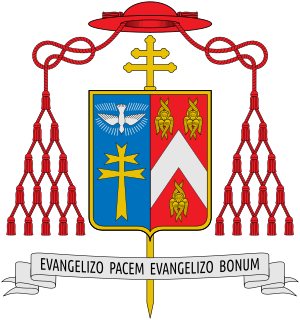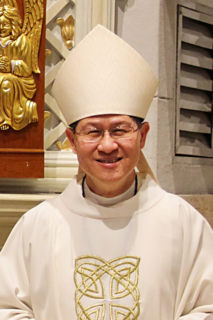The Roman Curia comprises the administrative institutions of the Holy See and the central body through which the affairs of the Catholic Church are conducted. The Roman Curia is the institution which the Roman Pontiff ordinarily makes use of in the exercise of his supreme pastoral office and universal mission in the world. It is at the service of the Pope, successor of Peter, and of the Bishops, successors of the Apostles, according to the modalities that are proper to the nature of each one, fulfilling their function with an evangelical spirit, working for the good and at the service of communion, unity and edification of the Universal Church and attending to the demands of the world in which the Church is called to fulfill her mission.

Fiorenzo Angelini was an Italian cardinal of the Roman Catholic Church. He served as the President of the Pontifical Council for the Pastoral Care of Health Care Workers in the Roman Curia, and was elevated to the cardinalate in 1991. When Cardinal Ersilio Tonini died on 28 July 2013, Cardinal Angelini became the oldest living cardinal until the next consistory where Pope Francis appointed 98-year-old Archbishop Loris Francesco Capovilla as a cardinal.

The Dicastery for the Eastern Churches, previously named Congregation for the Oriental Churches or Congregation for the Eastern Churches, is a dicastery of the Roman Curia responsible for contact with the Eastern Catholic churches for the sake of assisting their development and protecting their rights. It also maintains whole and entire in the one Catholic Church the heritage and canon law of the various Eastern Catholic traditions. It has exclusive authority over the following regions: Egypt and the Sinai Peninsula, Eritrea and northern Ethiopia, southern Albania and Bulgaria, Cyprus, Greece, Iran, Iraq, Lebanon, Israel, Syria, Jordan and Turkey, and also oversees jurisdictions based in Romania, Southern Italy, Hungary, India and Ukraine.
In the Roman Curia, a congregation is a type of department of the Curia. They are second-highest-ranking departments, ranking below the two Secretariats, and above the pontifical councils, pontifical commissions, tribunals and offices.
The Pontifical Council Cor Unum for Human and Christian Development was a pontifical council of the Roman Curia of the Catholic Church from 1971 to 2016.

The Pontifical Council for Justice and Peace was a pontifical council of the Roman Curia dedicated to "action-oriented studies" for the international promotion of justice, peace, and human rights from the perspective of the Roman Catholic Church. To this end, it cooperates with various religious institutes and advocacy groups, as well as scholarly, ecumenical, and international organizations.
The Pontifical Council for the Family was a pontifical council of the Curia of the Roman Catholic Church from 1981 to 2016. It was established by Pope John Paul II on 9 May 1981 with his motu proprio Familia a Deo Instituta, replacing the Committee for the Family that Pope Paul VI had established in 1973. The Council fostered "the pastoral care of families, protects their rights and dignity in the Church and in civil society, so that they may ever be more able to fulfill their duties."

The Pontifical Council for Culture was a dicastery of the Roman Curia charged with fostering the relationship of the Catholic Church with different cultures. It was erected by Pope John Paul II on 20 May 1982 and in 1993 he merged the Pontifical Council for Dialogue with Non-Believers, which had operated independently since 1965 into it. When the Apostolic constitution Praedicate evangelium promulgated by Pope Francis took effect on 5 June 2022, the Pontifical Council for Culture was merged with the Congregation for Catholic Education to create the new Dicastery for Culture and Education.
A pontifical council is a mid-sized department or dicastery of the Roman Curia, the central organization responsible for assisting the pope in the governance and oversight of Catholic Church. Such a council has a cardinal or archbishop as its president and is restricted in its activities in comparison with the larger parts of the Curia.
Pastor bonus is an apostolic constitution promulgated by Pope John Paul II on 28 June 1988. It instituted a number of reforms in the process of running the central government of the Catholic Church.
The Pontifical Council for Social Communications was a dicastery of the Roman Curia that was suppressed in March 2016 and merged into the Secretariat for Communications.

Stanisław Marian Ryłko is a Polish Cardinal of the Roman Catholic Church. He held positions in the Roman Curia beginning in 1987 and was president of the Pontifical Council for the Laity from 2003 to 2016. He was made a cardinal in 2007. He has been Archpriest of the Basilica of Santa Maria Maggiore since 28 December 2016.
The Pontifical Council for the Pastoral Care of Migrants and Itinerant People was a pontifical council of the Roman Curia. The council, established by Pope John Paul II on 28 June 1988, was dedicated to the spiritual welfare of migrant and itinerant people.
The Pontifical Academy for Life or Pontificia Accademia per la Vita is a Pontifical Academy of the Roman Catholic Church dedicated to promoting the Church's consistent life ethic. It also does related research on bioethics and Catholic moral theology.
The Pontifical Council for the Laity was a pontifical council of the Roman Catholic Curia from 1967 to 2016. It had the responsibility of assisting the Pope in his dealings with the laity in lay ecclesial movements or individually, and their contributions to the Church. Its last Cardinal President from 4 October 2003 to 31 August 2016 was Cardinal Stanisław Ryłko. Its undersecretary from 1967 to 1976 was Professor Rosemary Goldie, the first woman to be the Undersecretary of a Pontifical Council and the highest-ranking woman in the Roman Curia at the time. Another layman, Professor Guzmán Carriquiry Lecour, was undersecretary from 1991 to 2011.

Luis Antonio Gokim Tagle is a Filipino prelate of the Catholic Church currently serving as the Pro-Prefect for the Section of Evangelization of Dicastery for Evangelization since June 5, 2022, and as the President of Interdicasterial Commission for Consecrated Religious since December 8, 2019. He was the 32nd Archbishop of Manila from 2011 to 2019. Tagle is the Cardinal-Bishop of San Felice da Cantalice a Centocelle and also serves as the President of Caritas Internationalis, President of the Catholic Biblical Federation, Grand Chancellor of the Pontifical Urbaniana University, and as a member of various departments and dicasteries in the Roman Curia.
The Dicastery for the Laity, Family and Life is a dicastery of the Roman Curia. Pope Francis announced its creation on 15 August 2016, effective 1 September 2016. It took over the functions and responsibilities of the Pontifical Council for the Laity and the Pontifical Council for the Family. It has responsibility "for the promotion of the life and apostolate of the lay faithful, for the pastoral care of the family and its mission according to God's plan and for the protection and support of human life."
The Dicastery for Promoting Integral Human Development is a dicastery of the Roman curia.
Praedicate evangelium is an apostolic constitution reforming the Roman Curia and was published and promulgated on 19 March 2022 by Pope Francis; the document took effect on 5 June 2022.
The Dicastery for Culture and Education is an administrative unit of the Roman Curia. It began operations on 5 June 2022 as established by the apostolic constitution Praedicate evangelium promulgated on 19 March 2022. It was formed through the merger of two earlier bodies, the Pontifical Council for Culture and the Congregation for Catholic Education.





